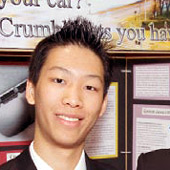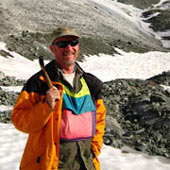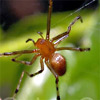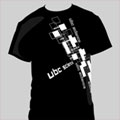
Learning Centre Honours Dot.Ca 'Godfather'

Years before the World Wide Web emerged as a household phrase, former Computer Science IT Manager John Demco was leading the charge to put Canada on the Internet map.
Demco—honoured last week with the establishment of the Demco Learning Centre at UBC—conceived the dot.ca domain in 1983, and went on to administrate domain registrations for 10 years as a volunteer. That foresight gave Canadian universities and businesses a distinct home on the Internet.
"John's vision and dedication is an inspiration to students, faculty and staff at Computer Science and UBC," notes Computer Science head Bill Aiello. "Putting his name on a facility that caters to the needs of our undergraduate students seems very fitting."
"It's gratifying to be recognized by my community," says Demco. "I'd like to acknowledge those who worked with me on this project and the department for creating an environment that fosters volunteerism and innovation."
By 2000, almost 100,000 dot-ca domain names had been registered by Demco's team of UBC volunteers, and CIRA, a not-for-profit corporation was created to manage the growing registry. This April, the number of dot-ca domains reached more than one million.
» Read more Dot.Ca Godfather...
AirCrumble and Rising Stars Ramp Up Undergrad Research

Evan Woo, a UBC Science Entrance Award winner at this year's Canada-wide Science Fair, has been named a Student Innovator by the British Columbia Innovation Council. Inspired by the landing gear of the Mars Exploration Rover, Woo envisioned AirCrumble—external airbags to cushion low-speed automobile collisions.
And over 60 undergraduate students from 27 institutions across Canada presented research projects at UBC's inaugural Rising Stars of Research poster competition this August. Eric Asava-Aree, a second-year Microbiology and Immunology student, won a top-prize for a poster looking at the contribution of T-cells to intestinal inflammation and fibrosis. Rising Stars is the brain child of François Jean, Associate Professor with Microbiology and Immunology, and emerged as a collaboration between the department, the VP Research and the Faculty of Graduate Studies.
Turning Science Students on to Teaching
A new dual degree out of the faculties of Science and Education is designed to encourage science students to consider teaching as a rewarding career. The dual BSc-BEd program, to be launched this fall, allows science majors to begin taking education courses towards a teaching specialization as early as second year.
Better equipped science teachers in elementary and secondary schools means more qualified and engaged science undergraduates—and later, graduate students—in B.C. universities, says Science Dean Simon Peacock.
"Students who are inspired at a young age to think about science as an exciting way of understanding the world around them are more likely to choose science—or science education—as a career," says Peacock.
Students in the program can maintain core studies as a science major in physics or math and gradually increase their education courses and in-school experiences. After completing a fifth-year which includes both science courses and an extended teaching practicum, graduates qualify for recommendation a professional teaching certificate.

Killam Teachers with Kindness
 Remember that great first-year science prof who got you excited about molecular weights, plate tectonics or the probability of winning the lotto? Well, here's your chance to thank them. UBC Science is seeking nominations for 2008 Killam Teaching Awards, and all it takes is a letter! Deadline is October 10.
Remember that great first-year science prof who got you excited about molecular weights, plate tectonics or the probability of winning the lotto? Well, here's your chance to thank them. UBC Science is seeking nominations for 2008 Killam Teaching Awards, and all it takes is a letter! Deadline is October 10.

UBC—Mineral Exploration Joint Venture Appoints New Director

Science alumnus Craig Hart has been appointed director of the Mineral Deposit Research Unit, the award-winning industry-UBC partnership based in the department of Earth and Ocean Sciences. Hart, well known to the Canadian geoscience community, is currently a senior research fellow at the Centre for Exploration Targeting at the University of Western Australia. He'll assume the position this January.
"We're pleased to appoint Craig as the new director," said Ian Graham, chair of the MDRU Board of Directors and Chief Geologist, Diamonds, Rio Tinto. "We welcome Craig back to Canada, and look forward to working with him to continue the research and training excellence that has been established at MDRU."
Physics Co-op Explores Careers, Singapore Synchrotron Light

Co-op stints at BC's Children's Hospital and the National University of Singapore might seem worlds apart, but for physics student Kelly McPhee, both destinations are all about exploration.
"The co-ops—especially the time at Children's—really helped set my career sights on medical physics," says McPhee, a fifth-year honours student. "At BCCH I researched and implemented a functional MRI quality assurance protocol for the Children's Brain Mapping Centre." It's work that has had a lasting impact beyond career planning—not only is the protocol still in use at BCCH, but McPhee will be doing an MRI research project as an undergrad thesis this year.
And while it was the time at BCCH that really helped McPhee map out some professional options, a recent co-op at the Singapore Synchrotron Light Source helped cement those plans, and offered a taste of South East Asia. "I did a lot of travelling while I was there," says McPhee. "My boss really encouraged me to get a taste of South East Asia." That included trips to Ho Chi Minh City, Bali, Kuala Lumpur, Thailand and Cambodia.
"The whole summer was a huge cultural experience—just being immersed in other cultures. There is also a lot of history in South East Asia—it really makes you aware that we live in a relatively new country."
But the placement wasn't all about travel, culture and cuisine. McPhee's work at NUS involved modelling x-ray reflectivity for thin film characterization. "In a nutshell, you shine x-rays at a surface at grazing angles, and model the reflected beam." That gives you information about the density of the layers in the surface of the material you're analysing, the thickness of layers, and interface and surface roughness.

Help Pick Targets for Humble Telescope
 David Gamey of Toronto and Gordon Sarty of Saskatoon are the first two amateur stargazers to win time on the MOST telescope, a Canadian Space Agency mission led by Physics and Astronomy's Jaymie Matthews. And you could be next—the door is still open for aspiring Canadian skygazers to submit ideas.
David Gamey of Toronto and Gordon Sarty of Saskatoon are the first two amateur stargazers to win time on the MOST telescope, a Canadian Space Agency mission led by Physics and Astronomy's Jaymie Matthews. And you could be next—the door is still open for aspiring Canadian skygazers to submit ideas.

Backward Comet May be Astronomical Missing Link

An international team of scientists that includes UBC's Brett Gladman has found an unusual object whose backward and tilted orbit around the Sun may clarify the origins of certain comets.
In the first discovery of its kind, researchers from Canada, France and the United States have found an object that orbits around the Sun backwards tilted at an angle of 104 degrees—almost perpendicular to the orbits of the planets. "Certain types of comets are not naturally produced after planet formation, especially those with highly tilted orbits," says Gladman. "This discovery may finally show how they transition from the Oort Cloud to become objects like Halley's Comet."
» Read more Backward Comet ...

Shedding Armour Helps Tiny Fish Thrive, Helps Darwin
Could shedding some genetically induced excess baggage have helped a tiny fish thrive in freshwater? A UBC grad student takes a very close look at the stickleback fish.
Salmonella Bacteria Lay Down their Lives for the Common 'Good'
Michael Doebeli applies a mathematical model to bacteria to show how self-destructive traits can evolve in biological populations—and create more damaging infections.
Spiders Who Eat Together, Stay Together
UBC zoologists discover that social spiders that work together and capture larger prey can stretch the laws of nature and develop enormous colonies.
Canada's First Goldschmidt Conference Highlights Science Get-Togethers
UBC Science hosted two top-notch scientific gatherings this summer. In July, Dean Simon Peacock welcomed researchers to Canada's first Goldschmidt Conference, the world's largest and most prestigious geochemistry conference. The event was hosted by Canada Research Chair Dominique Weis and the Department of Earth and Ocean Sciences. Later in the same month, UBC and the Department of Botany helped put on Botany Without Borders, the annual get together of the Canadian and American botanical societies. The events brought nearly 3,000 delegates to Vancouver.
UBC Sci T-Shirts Up for Grabs
 We want your feedback on Science Connect, and have the swag to prove it: t-shirts (designed by the Science Undergraduate Society), water bottles and business card holders. And congratulations to last issue's prize winners: Robert Blake (BA 1961, Math) and Wang Yip (BSc 2008, Computer Science).
We want your feedback on Science Connect, and have the swag to prove it: t-shirts (designed by the Science Undergraduate Society), water bottles and business card holders. And congratulations to last issue's prize winners: Robert Blake (BA 1961, Math) and Wang Yip (BSc 2008, Computer Science).

Featured Alumni
Sashko Despotovski (2003, Genetics Honours)

Current position: Investment banker, health care and technology, Ascenta Capital Partners Inc.
Best UBC memory: Being bitten by the discovery bug and publishing manuscripts. Then learning how finance is the backbone of every industry. And cofounding the UBC Salsa Club in 2002—a club that's still active!
Favourite professor or course: Daniel Pauly, for encouraging me to think freely. Also some fantastic researchers with the Jack Bell Research Centre at Vancouver General Hospital, Vincent Duronio, K-John Cheng and Gang Li. I also owe a tip of the hat to the UBC ethics group—philosophy is the origin of science!
Importance of science background: I'm highly specialized in health care and biotechnology sector finance, given the science training I obtained at UBC and the University of the Fraser Valley. That, along with my network, allowed me to be positioned as somewhat of an expert, especially with the tremendous support from Ascenta and several mentors. The past years have allowed me to vet deals in Europe and North America, and deal with groups from the Middle East, Africa and Asia. It's been quite an uplifting experience, and a great journey.
Most memorable experience after graduation: Learning how to apply all my classroom learning to the real world. Travels and interaction with colleagues from many corners of the world. Getting a good sense of how the world functions.
Overall UBC Science experience: It was well spent exploring and learning. I look forward to guiding new graduates with their careers.
Class Connections
1960's
Arv Hardin's (1963, Chemistry, 1970 Chemistry PhD) career in chemistry evolved from investigating poisonous and spontaneously combustible gases as a senior undergraduate to graduate studies in the infrared characteristics of ices at low temperatures, surface sciences, environmental sciences, catalysis, oil sands technology, and petrochemicals. During that process Hardin also shifted professional focus—from being a scientist to being a technical manager and consultant in research and development and strategic planning. He also got married and had three sons, now with four grandchildren! From 1993 to 2005 Hardin worked for the Saudi Arabian Basic Chemicals Corporation in Riyadh. Currently semi-retired, Hardin is still active—conducting some regional and international business management consulting. "I could have never imagined as a student where my career would take me, but my education at UBC prepared me well. Many mentors and teachers helped and guided me in so many ways."
1980's
Randy Roesler (1984, Computer Science) wanted to be a physicist but found his talents leaned more toward bits and bytes than neutrinos and quarks. And with the high tech industry continuously re-inventing itself, he's been well entertained as he has moved from one technology to another. From a start building simple maintenance programs, today Roesler is a software architect and team manager helping companies design, build and sell enterprise applications.
2000's
After earning her degree, Vanessa Yu (2004, Biology) followed her passion for health care by taking health sciences courses and graduating from the cytotechnology program at the British Columbia Cancer Agency. Diagnostic cytology involves studying cells to detect cancer. "The work is visual, interesting and challenging," says Yu. A cytotechnologist is responsible for the microscopic examination of slides prepared from specimens, and may even collect, prepare and stain the specimens. "I really appreciate and accept responsibility for the impact my work has on patient care." Since earning her certificates, Yu has worked at the Anatomical Pathology Laboratory at St. Paul's Hospital. "I work with allied professionals in both the labs and hospital and interact with radiologists, nurses, technologists and patients. It's been an amazing journey with new discoveries along the way."
Wang Yip (2008, Math and Computer Science) just wrapped up his summer working as one of three student orientation coordinators for Imagine UBC. "The day turned out to be an incredible experience for first-years, volunteers and staff alike. Being part of Imagine was one of my career highlights." With a degree in math and computer science, Yip is looking for a position in high tech that will hopefully combine both specializations. "I've enjoyed several UBC courses, most of which will help me on this journey to the high-tech industry. Computer Science 420 challenged me with devilishly clever algorithms, and 445 not only spoke to my interests in algorithms, but highlighted applications for those algorithms. Both courses were personally satisfying."
Recent travels? A new family addition? A promotion or career transition? Whatever it is, we'd love to hear from you. Connect by sending a brief note to: science.connect@ubc.ca. We'll make every effort to include it in our next issue.
EVENTS
The Dominant Animal: Human Evolution and the Environment
Stanford entomologist and best-selling author Paul Ehrlich gives the Beaty Biodiversity Museum Lecture. Sold out: Last minute tickets may be available at the door!
» September 24, 2008
Integrating Sciences and the Humanities
Conference public keynote features Steven Pinker, Harvard University. Last-minute tickets still available.
» September 26, 2008
Messenger Flyby of Mercury
Catherine Johnson on NASA's flyby of Mercury. Hosted by the Pacific Museum of the Earth and EOS.
» September 26, 2008
UBC Culture Fest 100
Includes visits to the new Greenheart Canopy Walkway and a dedication ceremony to honour UBC Nobel laureate Michael Smith.
» Through September 28, 2008
Birds and Frogs: Freeman Dyson
UBC and the Pacific Institute of Mathematical Sciences host Canada's first AMS Einstein Public Lecture.
» October 4, 2008
A Blue Whale Comes to Victoria
An update on UBC researchers' work to assemble a blue whale skeleton in a Victoria Harbour warehouse.
» October 21, 2008
KUDOS
UBC Science Researchers Named to Canada's Royal Society
Ivar Ekeland, an internationally renowned mathematical economist, and Curtis Suttle, a researcher who has changed our understanding of biological oceanographic processes, elected to RSC.
Pauly Wins Ecology Prize
Influential biologist Daniel Pauly—a professor with the Department of Zoology and director of UBC's Fisheries Centre—awarded the fourth Ramon Margalef Prize in Ecology and Environmental Sciences.
EOS Researcher Wins RCS Marine Science Award
Roger Francois, Canada Research Chair in Marine Geochemistry for Global Climate Change in the Department of Earth and Ocean Sciences, wins the 2008 AG Huntsman Award.
Rio Tinto Award Goes to EOS Grad Student
Earth and Ocean Science PhD student Stephen Moss wins Rio Tinto oral presentation award at International Kimberlite Conference in Frankfurt, Germany.
Air Quality, Weather Forecasting Projects Net Climate Research Funding
Two UBC Science projects, one looking at improved weather forecasting and the other investigating the effects of international pollutants, receive $300,000 from Canada's major climate research funder.
UBC Physicists' Bright Idea Gets Clean Energy Support
Illumination system designed by UBC physicists that directs daylight into the core of office buildings receives $2 million in funding from BC's Innovative Clean Energy initiative.
AstraZeneca Award Goes to UBC Prof
Chemistry's Jennifer Love recognized by pharmaceutical giant for outstanding contributions in synthetic organic chemistry.
New Head at UBC Statistics
Professor Nancy Heckman, internationally recognized for her work in non-parametric, or smoothing, regression, named head of the Department of Statistics.
Zoology Grad Students Named Top Young Scientists
Graduate students from the Department of Zoology win two of five 2008 Young Scientist awards handed out by Europe's Society of Experimental Biologists.
SCIENCE EDUCATION

Splicing Science and Creativety
UBC geneticist, writer and teacher David Ng wants to produce science-literate creative thinkers. The outreach efforts at Michael Smith Labs are featured in UBC Reports.
Uping the Odds at Stats With the CWSEI
UBC statistics instructor Bruce Dunham and the Carl Wieman Science Education Initiative have teamed up to appraise, and improve, key UBC-wide stats courses. More in this month's UBC Reports.
UBC SCI FACTS
1974: A National Triumph
The Tri-University Meson Facility (TRIUMF)—Canada's national laboratory for particle and nuclear physics—opens on UBC's South Campus. Houses the world's largest cyclotron, and is one of only three subatomic research facilities that specialize in producing extremely intense beams of particles.
GIVING OPPORTUNITIES
There are many ways to support UBC Science, including gifts left in wills, gifts of security or gifts of life insurance. For more information about giving options please contact Esther Jang:
P: 604-827-4464
E: esther.jang@ubc.ca
Copyright 2008, UBC Faculty of Science

